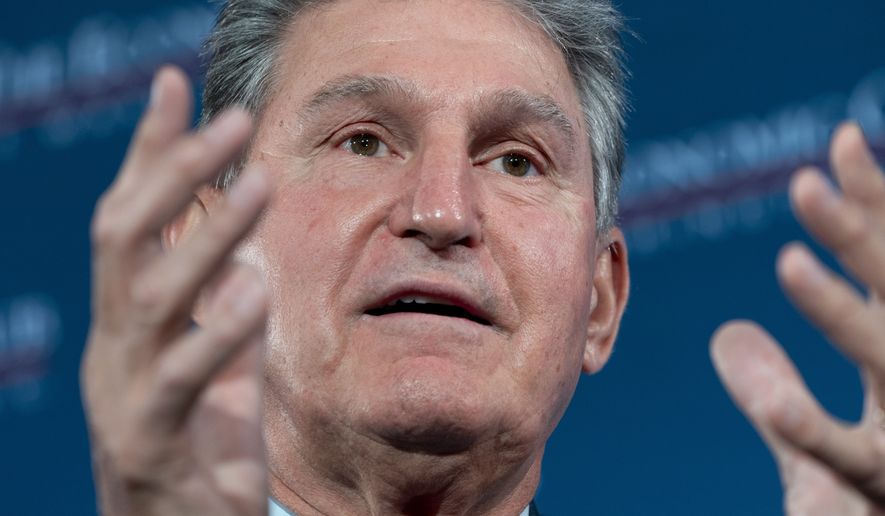Sen. Joe Manchin III said Tuesday that new regulations giving the IRS information on bank accounts with more than $10,000 in annual deposits or withdrawals would be left out of President Biden’s multitrillion-dollar expansion of the federal safety net.
Mr. Manchin, a key swing vote for the White House’s legislative agenda, told the Economic Club of Washington, D.C., that he had personally raised the issue with Mr. Biden during a meeting over the weekend.
“The president and I had this conversation. I said … ’Do you understand how messed up that is to think that Uncle Sam’s going to be watching transactions … this cannot happen, it’s screwed up,’” said Mr. Manchin, West Virginia Democrat. “So I think that one’s going to be gone.”
Congressional Democrats have long sought to boost the IRS’s powers to crack down on tax scofflaws. Initially, Mr. Biden sought new regulations requiring banks to report annually on the “inflows and outflows” of personal and business accounts with more than $600 in transactions annually.
After significant pushback, Democrats raised the threshold to $10,000 and created exemptions for wages. The compromise did little to mollify critics, however.
Republicans say the proposal amounts to a massive expansion of federal power, comparable to that of a “surveillance state.” They also note that the exemption covers only deposits and does not include how the money is ultimately spent.
Sen. Mike Crapo of Idaho, the top Republican on the Senate Finance Committee, said everyday citizens would be ensnared by the proposal even at the $10,000 threshold. He pointed to data from the Bureau of Labor Statistics showing “the average American” has more than $61,000 in financial transactions annually.
“The list goes on and on: health care, groceries, restaurants, entertainment, cash contributions, apparel clothing, education and personal care,” Mr. Crapo said. “The average American runs $61,000 through their account. … [They] will be picked up by this plan, and I think [so will] virtually every small business.”
Democrats defend the policy saying extra scrutiny is needed to eliminate the “tax gap,” the difference between the amount owed to the federal government and the amount that reaches government coffers. The Treasury Department has estimated the shortfall in taxes collected from the top 1% of filers amounts to some $160 billion a year.
“Under the current system, American workers pay virtually all their tax bills while many top earners avoid paying billions in the taxes they owe by exploiting the system,” said Treasury Secretary Janet Yellen.
Mr. Manchin disagrees with that assessment, arguing that the White House’s planned $80 million investment in IRS enforcement will be sufficient, without needing to give the agency more power.
“The IRS is going to be able to do the job that they should be doing and they’re going to be able to modernize their computer systems and be able to do what they’re intended to do,” he said. “They were never enabled to go into bank accounts to the point of every individual.”
• Haris Alic can be reached at halic@washingtontimes.com.




Please read our comment policy before commenting.